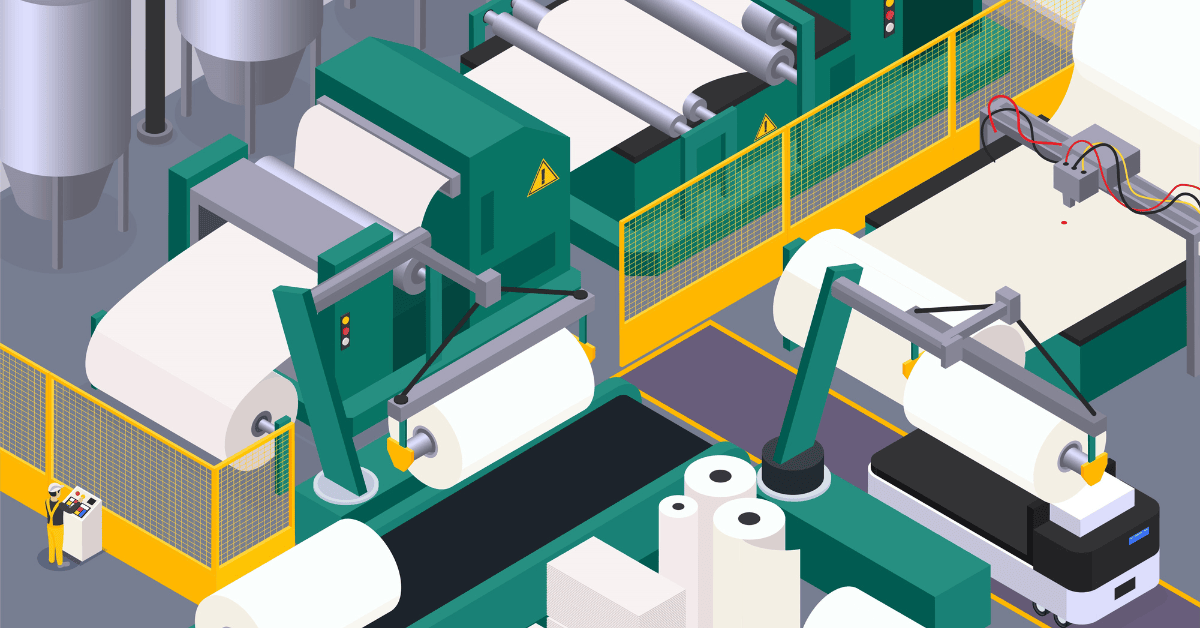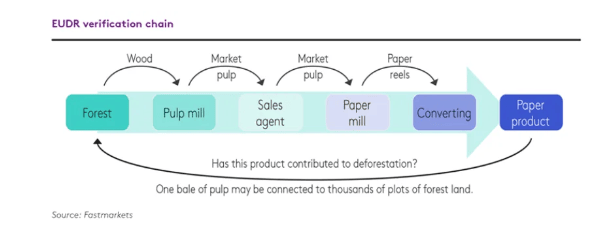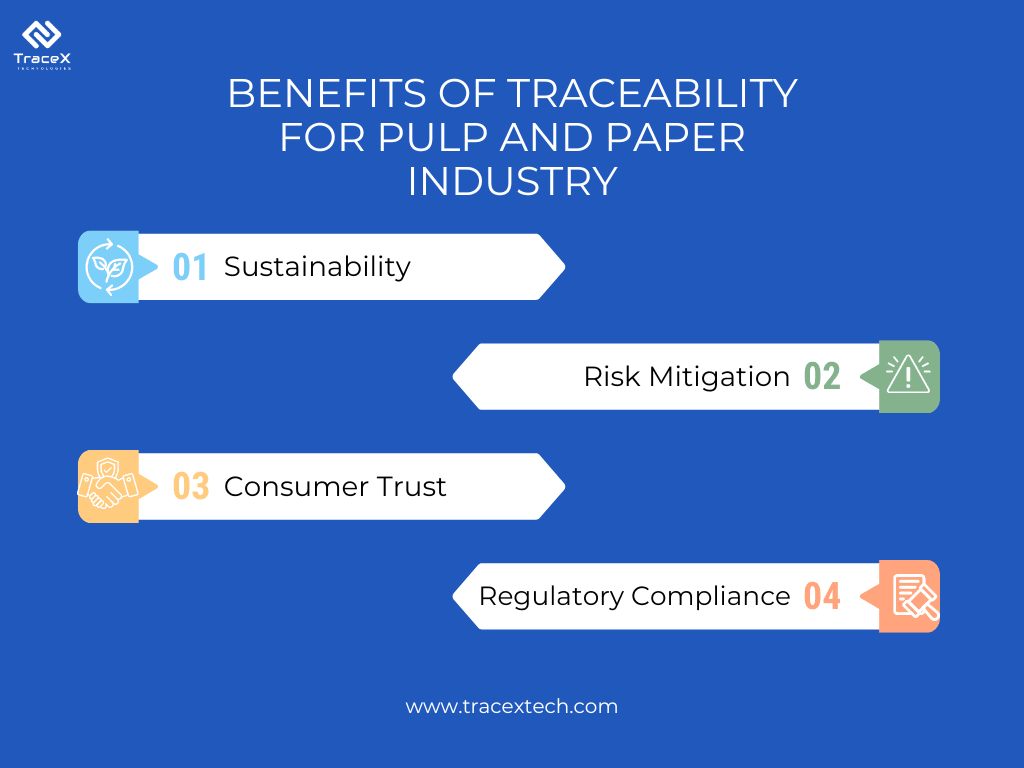Contact: +91 99725 24322 |
Menu
Menu
Quick summary: Explore the impact of the EU Deforestation Regulation (EUDR) on the pulp and paper industry. Learn how companies are adapting to stringent deforestation-free supply chain requirements and what it means for sustainability efforts and regulatory compliance.

The pulp and paper industry has long been intertwined with deforestation, with forests being cleared at alarming rates to meet the world’s demand for paper products. But as consumers and businesses become more aware of environmental impacts, the pressure is mounting. The European Union’s Deforestation Regulation (EUDR) is about to change the game.
According to WWF, the pulp and paper industry ranks among the largest industrial sectors globally, exerting significant impact on worldwide forests. This sector produces items like office and catalog paper, glossy paper, tissues, and paper-based packaging, representing 13–15% of overall wood usage and consuming 33–40% of all industrial wood exchanged on a global
The European Union’s Deforestation Regulation (EUDR) is changing the way businesses source commodities, particularly in the pulp and paper industry. If your business relies on imported pulp and paper, understanding the EUDR is crucial—not just for compliance, but for ensuring your supply chain remains sustainable, ethical, and transparent. For the pulp and paper industry, it’s no longer business as usual. The new regulation demands more than just words on sustainability—it requires hard evidence. And if companies aren’t prepared, they face penalties, disrupted supply chains, and reputational damage.
So, how will the pulp and paper industry adapt to these sweeping changes? Let’s dive into the impact and what it means for businesses moving forward.
Key Takeaways
The EU Deforestation Regulation (EUDR) is a new set of rules aimed at curbing deforestation by ensuring that certain commodities entering the European market are not linked to deforestation or forest degradation. The EUDR follows a 2021 EU proposal that targets key products associated with deforestation, including soy, palm oil, beef, and notably, pulp and paper.
The regulation has a clear focus: to halt deforestation driven by agricultural commodities. For industries such as pulp and paper, this means a major shift in how raw materials are sourced, processed, and certified. The European Union is taking a stand, emphasizing that deforestation and ecosystem degradation can no longer be tolerated if we are to meet climate goals and preserve biodiversity.
The EUDR requires companies to prove that their products are not tied to deforestation, either directly or indirectly. This adds a new level of responsibility, pushing businesses to improve transparency and traceability across their supply chains.
Forests are critical for carbon sequestration, biodiversity, and the well-being of countless communities worldwide. The production of pulp and paper has historically been linked to significant deforestation, especially in tropical regions. The EUDR is a legislative effort to reduce these impacts, ensuring that Europe plays its part in global sustainability efforts.
According to WRI, the world’s forests emitted an average of 8.1 billion metric tonnes of carbon dioxide into the atmosphere each year due to deforestation and other disturbances, and absorbed 16 billion metric tonnes of CO2 per year.
Pulp and paper might not be the first products that come to mind when discussing deforestation, but the industry has long been associated with forest degradation. From logging in the Amazon to the deforestation of tropical forests in Southeast Asia, unsustainable paper production practices have contributed significantly to global deforestation.
Forests are the lungs of our planet. They absorb about 2.6 billion tonnes of carbon dioxide annually, making them a critical tool in the fight against climate change. However, illegal logging and unsustainable forest management practices continue to threaten these ecosystems. The graphic paper sector in Europe could encounter two significant issues stemming from the EUDR. Firstly, securing sufficient market pulp at a competitive price may prove challenging, likely raising production expenses and jeopardizing local manufacturing. Secondly, there exists a risk of interruptions in global trade.
In regions like Brazil and Indonesia, illegal logging for timber and pulp has led to widespread deforestation. According to the Food and Agriculture Organization (FAO), an estimated 10 million hectares of forest are lost each year due to agriculture and industry, with the paper industry being a key contributor.
The EU is a significant consumer of pulp and paper products, importing vast quantities from countries where deforestation risks are high. Countries like Brazil, Indonesia, and Malaysia, known for their tropical rainforests, are primary suppliers of pulp to the European market. The EUDR’s focus on this industry is not arbitrary—it targets sectors that have historically contributed to large-scale forest loss.
The main concern for the European paper and board sector is linked to pulp, with over 6 million tonnes imported in 2023, predominantly from Brazil, North America, and Chile.
Imports of market pulp from Brazil could face increased risk due to the country potentially being labelled as having a high deforestation risk, which would result in stricter compliance demands. Nevertheless, given the advanced practices of many pulp manufacturers in Brazil, the EUDR might offer a chance rather than a
The EUDR (European Union Deforestation Regulation) is set to transform the pulp and paper industry, requiring publishers to prove that their paper sources are deforestation-free and fully traceable. For publishing companies, this means ensuring compliance with strict geolocation tracking, supplier verification, and sustainable sourcing standards to maintain uninterrupted access to the EU market.
The EUDR lays out clear requirements for businesses, especially those in the pulp and paper sector, to ensure they are not contributing to deforestation. Understanding these requirements is essential for any business looking to continue importing pulp and paper into the EU.
Under the EUDR, businesses must perform due diligence on their supply chains to ensure their products are free from deforestation. This includes:
A major requirement of the EUDR is traceability. This means that companies must be able to trace their products back to the specific plot of land where the raw material (e.g., wood pulp) was harvested. Companies must provide geo-coordinates and detailed records of each step in the supply chain to prove compliance.
If a business cannot trace its product back to its origin, it will not meet the standards of the EUDR, risking penalties, fines, and even a ban from the EU market.

One of the core components of the EUDR is traceability. In the pulp and paper industry, ensuring that every product can be traced back to its source is essential for compliance. But traceability isn’t just about meeting regulatory standards—it’s about protecting forests and ensuring the long-term sustainability of supply chains.
Traceability refers to the ability to track the journey of a product from its origin to its final destination. For the pulp and paper industry, this means tracking the raw wood used to make pulp from the forest where it was harvested, through processing, to the paper product that lands in the hands of consumers.

The first step is understanding your current supply chain. Where do your raw materials come from? Are your suppliers adhering to sustainable practices? Conduct a thorough audit to map your supply chain and identify any areas where deforestation might be occurring.
To comply with the EUDR, you’ll need robust traceability systems. This might mean investing in blockchain technology, IoT devices, or satellite monitoring to track your products from the forest to the factory.
Your suppliers play a critical role in your compliance with the EUDR. Engage with them early to ensure they understand the new requirements and are committed to sustainable practices. Establish clear expectations and consider working only with suppliers who can guarantee deforestation-free products.
Risk assessments are a key part of the EUDR. You’ll need to identify where the risks of deforestation are highest within your supply chain and take action to mitigate these risks.
The EUDR is just one of many new regulations designed to combat deforestation. Stay informed on upcoming legislation, both within the EU and globally, to ensure your business stays ahead of the curve.
The EUDR, while challenging, offers an opportunity for businesses to adopt more sustainable practices. Consumers are increasingly demanding products that are ethically sourced and environmentally friendly. By committing to sustainable practices, businesses can not only comply with regulations but also attract a more conscientious customer base.
In addition, sustainability can help businesses improve efficiency, reduce waste, and lower costs. Many companies that have embraced sustainability report better financial performance in the long run.
While the EUDR may seem like a daunting regulation to comply with, the long-term benefits are worth the effort. Compliance with the EUDR not only helps protect the planet but also ensures your business remains competitive in an evolving marketplace.
Meeting the stringent requirements of the European Union’s Deforestation Regulation (EUDR) can be a complex task for businesses. The EUDR demands complete transparency in supply chains, requiring companies to prove that their products are free from deforestation. This is especially challenging for industries like agriculture, pulp and paper, and rubber, where supply chains can span multiple countries and involve numerous stakeholders.
Technology solutions such as blockchain, IoT, and advanced data analytics are transforming the way companies track and report their supply chains. These tools help automate data collection, ensure data integrity, and provide real-time visibility into the origin of raw materials. They simplify the process of due diligence by centralizing all the necessary data, making it easier for businesses to demonstrate compliance with the EUDR.
By using digital tools, companies can efficiently track the movement of commodities from their source to their final destination, ensuring they meet EUDR’s traceability requirements. This not only helps avoid hefty fines (up to 4% of turnover) but also builds trust with regulators, stakeholders, and consumers.
The TraceX EUDR Compliance platform is designed to take the burden off businesses by offering a blockchain-based solution for seamless traceability. With TraceX, companies can geo-map farm areas, verify their deforestation-free status, and store all essential data in an immutable ledger, providing the transparency and trust needed for EUDR compliance.
The EU Deforestation Regulation is set to transform the pulp and paper industry by requiring businesses to take greater responsibility for their supply chains. While the compliance process may seem challenging, it is also an opportunity to embrace sustainability, build consumer trust, and future-proof your business. By investing in traceability systems, engaging with suppliers, and committing to sustainable practices, businesses can not only meet the requirements of the EUDR but also thrive in a world where sustainability is becoming a key driver of success.
Are you ready to comply with the EUDR? Now is the time to take action, protect forests, and secure the future of your business.
The EUDR is a new EU regulation aimed at preventing the import of products linked to deforestation. For the pulp and paper industry, this means companies must prove their products do not originate from deforested areas, requiring greater transparency in their supply chains and stricter sourcing practices.
The biggest challenges include mapping and monitoring complex supply chains, verifying the origin of raw materials, and maintaining up-to-date documentation. Compliance will require advanced traceability solutions and close collaboration with suppliers.
Companies can adopt technology solutions like blockchain and satellite monitoring to ensure real-time tracking of their raw material sources. Platforms like TraceX help automate data collection and ensure compliance with EUDR by providing transparent, verifiable records of deforestation-free supply chains.
